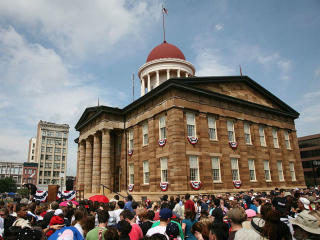Supreme Court rules on political speech and the First Amendment
 On Tuesday, the Supreme Court handed down its opinion in Heffernan v. City of Paterson, a case that involved the First Amendment, political speech, and the innocuous actions of a police officer helping his bedridden mother. The main question the Court was tasked with answering was whether government employers violate the First Amendment if they punish subordinates for their political speech, even if a superior was mistaken and the subordinate was not actually engaging in political expression.
On Tuesday, the Supreme Court handed down its opinion in Heffernan v. City of Paterson, a case that involved the First Amendment, political speech, and the innocuous actions of a police officer helping his bedridden mother. The main question the Court was tasked with answering was whether government employers violate the First Amendment if they punish subordinates for their political speech, even if a superior was mistaken and the subordinate was not actually engaging in political expression.
The case was brought by Jeffrey Heffernan, a police officer in Paterson, New Jersey, who was seen by fellow officers holding a yard sign for Lawrence Spagnola, a candidate in the city’s mayoral election. Heffernan picked up the sign at the behest of his mother and delivered it to her, but other officers who saw Heffernan with the sign quickly told his supervisors. Those supervisors believed that Heffernan was involved in the Spagnola campaign, and demoted him the next day for “overt involvement” in the election.
So, Heffernan brought suit in a federal court in New Jersey, claiming that his First Amendment rights had been violated. The court rejected his argument, however, and reasoned that, since he was not actually engaging in political speech, his First Amendment rights were not violated, despite the fact that his supervisors believed that he was. The U.S. Court of Appeals for the Third Circuit agreed, maintaining that Heffernan could only bring suit if he was actually exercising his free speech rights.
But in a 6-2 decision, the Supreme Court reversed the Third Circuit’s decision. The majority opinion, authored by Justice Stephen Breyer, looks to the text of the First Amendment and the relevant federal statute that governs when one can bring suit in light of a violation of one’s constitutional rights.
42 USC § 1983 authorizes that anyone who is “deprived” of a “right … secured by the Constitution” can bring suit in federal court. Justice Breyer explains that the text of the law, and the relevant Supreme Court precedents, are not clear as to whether the “right” depends on actual activity, like Heffernan’s apolitical delivery of the sign to his mother, or the motive of the government agent that abridges the constitutional right, like the supervisor who believed that Heffernan was engaged in political expression.
In light of this ambiguity, the majority looks to the text of the First Amendment, which says that “Congress shall make no law … abridging the freedom of speech.” The First Amendment, Justice Breyer explains, focuses on the activity of the government, and proscribes the supervisor’s “constitutionally harmful policy whether Heffernan did or did not in fact engage in political activity.” The decision ends with the Court remanding the case, meaning that it sent the case back to a lower court for further review.
Throughout the opinion, the majority assumes that the supervisor’s interference with political speech was constitutionally impermissible, but the Justices note that there are exceptions that allow restrictions on the speech of government employees. If, for example the speech impedes the “efficiency” or “effective[ness]” of a government service, then a supervisor can legally punish a subordinate for that speech. The Court did not rule on whether, in this particular instance, this exception was applicable, instead instructing the lower courts to consider that question.
Justices Clarence Thomas and Samuel Alito filed a dissent, writing that “nothing in the text of §1983 provides a remedy against public officials who attempt but fail to violate someone’s constitutional rights.” They maintain that, in order to have a successful claim, Heffernan would need to have proven that his free speech rights were actually infringed upon. However, Heffernan did not actually support Spagnola’s campaign; although Heffernan was harmed, it did not amount to “the right kind of harm” under §1983. Still, the dissenters seem sympathetic to Heffernan, noting that “demoting a dutiful son who aids his elderly, bedridden mother may be callous, but it is not unconstitutional.”
The potential impact of this case on our understanding of the First Amendment is notable, as the Court expanded the notion of who can seek redress under a free speech claim. It determined that the actions and intentions of the government are more important than what aggrieved citizens are actually doing. It sent a signal that the Court is more interested in erring on the side of caution when it comes to fundamental constitutional rights.
Jonathan Stahl is an intern at the National Constitution Center. He is also a senior at the University of Pennsylvania, majoring in politics, philosophy and economics.

does the U.S. CONSTITUTION apply to Pocahontas county ???? at times it doesn`t seem like it does it .....
ReplyDelete